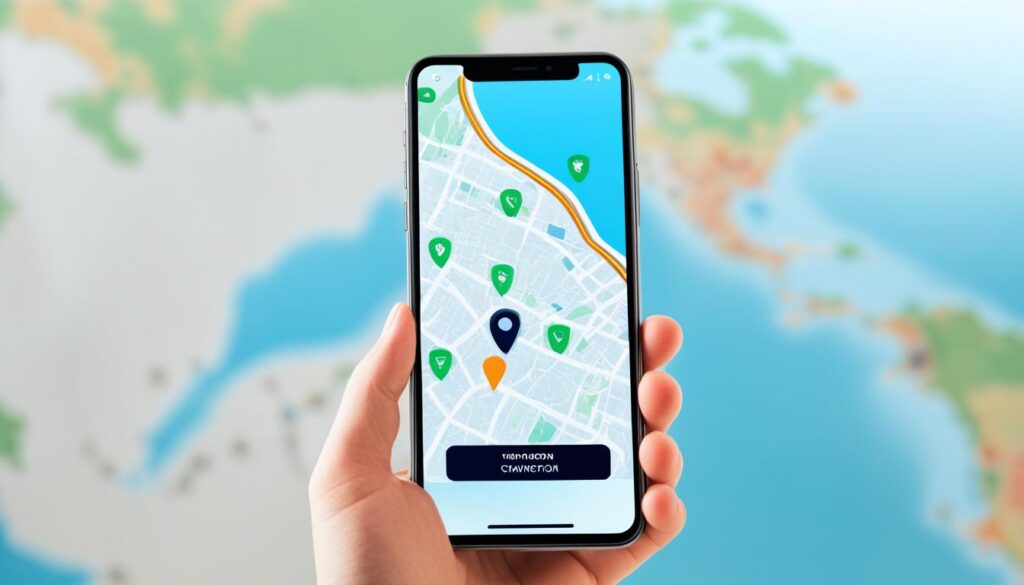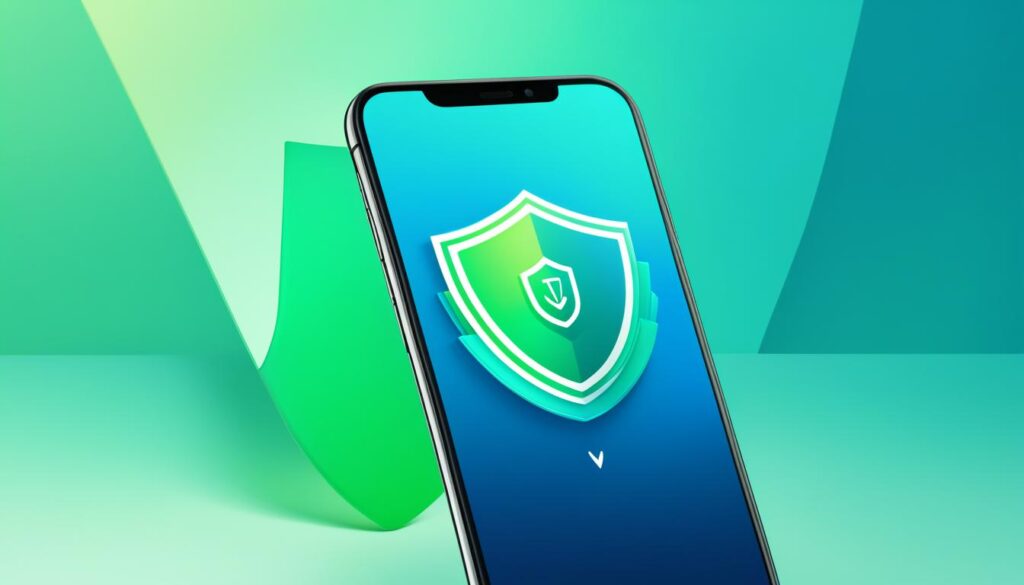Did you know that over 1.2 billion people worldwide use virtual private networks (VPNs) to change their location and access geo-restricted content? Whether it’s streaming the latest shows on Netflix, bypassing online censorship, or enhancing your personal privacy, a reliable VPN can be a game-changer. However, not all VPNs are created equal when it comes to location spoofing. In this comprehensive guide, I’ll explore the best tools and techniques to spoof your location and unlock a world of digital possibilities.
Key Takeaways
- VPNs can effectively mask your IP address and present you as being in a different location, allowing access to geo-restricted content.
- While iOS devices make location spoofing difficult, Android offers more options for faking your GPS location.
- Surfshark is a budget-friendly VPN that seamlessly integrates a built-in fake GPS location spoofer.
- Choosing a VPN with a large network of servers in your desired locations is crucial for successful location spoofing.
- Be mindful of legal and ethical considerations when using a VPN to change your location.
What is a VPN and How Does it Change Your Location?
While the classic use case for virtual private networks (VPNs) is to hide your IP address and keep your internet service provider (ISP) and other snoops from monitoring your online activities, it’s not the only reason. Once in a while you might need to appear like you’re in a different country without leaving the comfort of your own home. Perhaps you’re looking to evade some form of online censorship, or access a localized version of a website. Maybe you just want to watch a foreign version of Netflix. Whatever your need, a VPN is an excellent choice for location spoofing.
Understanding Virtual Private Networks (VPNs)
When you switch on a VPN, it creates an encrypted connection between your computer and a server controlled by the VPN company. Your data travels to the server, protected from prying eyes along the way, and then exits onto the internet as normal. Anyone watching will have a hard time tracking your movements across the web back to you, and your IP address will also be hidden. This is important, because one of the easiest ways to glean someone’s physical location is by looking at their IP address.
The Role of IP Addresses in Location Tracking
Most people will want to connect to a VPN server physically close to their true location. This usually yields better speed, which is what most users are concerned about. But if you connect to a VPN server that’s farther afield, you’re effectively browsing the web as though you were sitting on top of that server. This is the trick that allows you to access geo-restricted streaming content in other countries.
How VPNs Spoof Your Location by Masking Your IP
By masking your IP address and presenting a different virtual location, a VPN enables you to bypass geo-blocking and online censorship, granting access to a wealth of content and services that would otherwise remain off-limits. This makes VPNs an invaluable tool for secure browsing, remote access, and anonymous web surfing.
Benefits of Using a VPN to Change Location
The ability to modify your digital location, a process known as geo-spoofing, opens up a world of possibilities. Whether your motivation is to access geo-restricted content, bypass online censorship, or enhance your overall online privacy and security, a Virtual Private Network (VPN) can be a powerful tool.
Accessing Geo-Restricted Content
You’ve likely encountered instances of geo-blocked content during your online escapades. Copyright and licensing issues frequently underpin this digital segregation, leading streaming giants like Netflix and Disney+ to curate different content for different regions. With a VPN, you can easily circumvent these geographical barriers and enjoy unrestricted access to a wealth of content that would otherwise remain off-limits.
Bypassing Online Censorship
Various countries uphold strict online censorship, blocking access to anything from online gambling to political blogs. Thankfully, geo-spoofing with a VPN offers a simple workaround, granting you access to content that would otherwise remain censored and unavailable in your region.
Enhancing Online Privacy and Security
Beyond its utility for accessing restricted content, a Virtual Private Network (VPN) provides various security advantages. It encrypts your internet traffic and conceals your true IP address and location. As a result, you can relish enhanced online freedom and superior privacy and anonymity when navigating the digital landscape via a VPN.
vpn to change location
Finding a VPN that will work for your particular situation, however, can be a little bit more complicated. You’ll first need to find a VPN with servers in your desired country. Most VPN services list their servers somewhere on their websites. In practice, however, simply having support for a country may not be enough. You may find you’re not able to access the website or service you’d like for arcane network reasons. You might also need a more specific region than just a whole country—accessing the web from a random location within a country as large as Canada, for instance, could put you a long way off from your desired spot.
Choosing the Right VPN for Location Spoofing
Some VPNs let you specify which servers and sometimes even which cities you’d like to connect with. The top VPNs with the most server locations include ExpressVPN with 94 countries, CyberGhost VPN with 90 countries, and VPNArea with 65 countries. Using a VPN for location spoofing does come with some potential drawbacks. Some sites and services might also screen your location as part of their security measures. Many banks, for instance, might require you to present additional authentication if they see you logging in from a new or unusual location. Some sites might even block you altogether if they spot what appears to be VPN data, because the bad guys also know how useful a VPN can be.
Evaluating Server Locations and Network Size
The top VPNs with the most server locations include ExpressVPN with 94 countries, CyberGhost VPN with 90 countries, and VPNArea with 65 countries. Using a VPN for location spoofing does come with some potential drawbacks. Some sites and services might also screen your location as part of their security measures. Many banks, for instance, might require you to present additional authentication if they see you logging in from a new or unusual location. Some sites might even block you altogether if they spot what appears to be VPN data, because the bad guys also know how useful a VPN can be.
Top VPNs for Changing Your Location
When it comes to VPN to change location , not all virtual private network providers are created equal. To effectively mask your IP and spoof your location for geo-unblocking and enhanced online privacy , you’ll want to choose a VPN with robust features and reliable performance. Let’s explore some of the top VPN options for secure browsing , remote access , and anonymous web surfing.
NordVPN: Best VPN for Faking Your Location
NordVPN stands out as the premier choice for location spoofing. With over 5,000 servers across 60+ countries, NordVPN offers an expansive network to change your virtual location and bypass geo-restricted content. Boasting a strict no-logs policy and 24/7 customer support, NordVPN ensures both your data encryption and online privacy are protected.
Surfshark: Affordable VPN with Built-In Location Spoofing
If you’re looking for a budget-friendly VPN that still delivers exceptional location spoofing capabilities, Surfshark is an excellent option. This virtual private network allows an unlimited number of devices to connect simultaneously, enabling you to securely stream content from Netflix, Disney+, and other platforms. Surfshark’s no-logs policy and Double VPN servers further enhance your anonymous web surfing.
ExpressVPN: Reliable VPN for Consistent Connections
For those seeking a reliable VPN that consistently delivers on location spoofing, ExpressVPN is a top choice. With servers in over 90 countries, ExpressVPN offers a vast global network to change your virtual location. It’s user-friendly, secure, and boasts strong encryption, making it an excellent all-round VPN option for geo-unblocking and secure browsing.

How to Spoof Your Location with a VPN
The process of faking your location using a virtual private network (VPN) is straightforward, whether you’re connecting to a server in the United States or Australia. Here’s a step-by-step guide to changing your virtual location:
Step-by-Step Guide to Changing Your Virtual Location
- Subscribe to a reputable VPN service that offers a wide range of server locations. Some top options for location spoofing include NordVPN, Surfshark, and ExpressVPN.
- Download and install the VPN app on your device, whether it’s a computer, smartphone, or tablet.
- Open the VPN app and connect to a server located in your desired country or region. This will mask your IP address and make it appear as if you’re browsing from that location.
- Once connected, you can access geo-restricted content, such as streaming services, websites, or online platforms, as if you were physically located in that region.
Troubleshooting Tips for Unblocking Geo-Restricted Content
If you encounter any issues with accessing geo-blocked content, try the following troubleshooting tips:
- Connect to a different VPN server in the same country or region to find one that is not currently blocked.
- Clear your browser’s cache and cookies, as some sites may use these to detect and block VPN usage.
- Contact your VPN provider’s customer support for assistance in finding the best server locations for location spoofing and geo-unblocking.
Remember, the key to successful location spoofing with a VPN is finding a reliable service with a vast network of servers in your desired locations. By following these steps, you can easily change your virtual location and access a world of content and services that may otherwise be restricted or unavailable in your actual geographic region.
Faking GPS Location on Mobile Devices
While the process of changing your virtual location using a VPN is fairly straightforward, it’s also possible to fake your location on your mobile devices. This can come in handy when you need to access geo-restricted content or bypass censorship on the go.
Spoofing Location on Android Devices
On Android devices, you can easily download a fake GPS location app from the Google Play Store and use it alongside your preferred virtual private network (VPN). These apps allow you to set a custom IP masking and location spoofing to bypass geo-unblocking restrictions. This approach gives you the freedom to appear as if you’re browsing from any desired location, enabling access to online privacy, secure browsing, and remote access to data encryption and anonymous web surfing.
Limitations of Location Spoofing on iOS Devices
Unfortunately, the process of location spoofing on iOS devices is more challenging, as it typically requires jailbreaking your iPhone or iPad. Apple’s tight control over its operating system makes it difficult to modify the device’s GPS functionality without compromising the device’s security. While there are some methods that involve connecting your iOS device to a computer to spoof the location, these options are often cumbersome and may not work reliably. As a result, vpn to change location remains the more practical solution for most iOS users seeking to bypass geo-restrictions and enhance their online privacy and security.

Legality and Ethical Considerations
When it comes to using a VPN to change your location, there are some important legal and ethical factors to consider. While VPNs are generally legal to use, the specifics can vary depending on your location and the intended purpose.
Understanding Legal Restrictions on Location Spoofing
In some countries, there may be restrictions or even outright bans on using VPNs to spoof your location, particularly if it’s done to bypass censorship or access content that’s restricted due to licensing or copyright issues. It’s crucial to research the laws in your specific region to ensure you’re not running afoul of any regulations.
Responsible Use of VPNs for Location Changing
While a VPN can be a powerful tool for accessing geo-blocked content, online privacy, and secure browsing, it’s important to use it responsibly. Avoid using a VPN for any illegal activities, such as accessing content that’s restricted due to copyright or licensing agreements. Additionally, be mindful of how you present your virtual location to services and websites, as some may have policies against location spoofing.
By understanding the legal landscape and using a VPN for location changing in an ethical manner, you can enjoy the benefits of vpn to change location without running into any potential issues. Remember, the responsible use of virtual private networks and ip masking is key to maintaining your online privacy and security.
Advanced Location Spoofing Techniques
While using a VPN is an effective way to change your apparent location and access geo-restricted content, there are some advanced techniques you can explore to further enhance your location spoofing capabilities. One such technique is the use of dedicated IP addresses for location spoofing.
Using Dedicated IP Addresses for Location Spoofing
Some premium VPN providers offer the option of using dedicated IP addresses. These are IP addresses that are assigned exclusively to you, rather than being shared with other users on a VPN server. Dedicated IPs can make your location appear more consistent and less likely to be flagged as suspicious by websites and services. This can be particularly useful if you need to access sensitive or regulated content, as it can help you maintain a more stable and reliable connection from a specific location.
Combining VPNs with Other Location Spoofing Tools
In addition to using a VPN to change your location, you can also explore the use of other location spoofing tools to further enhance your privacy and bypass geo-restrictions. For example, some users combine the use of a VPN with a GPS spoofing app on their mobile devices to create a more comprehensive location masking solution. This can be especially helpful when accessing location-based services or apps that rely on GPS data to determine your whereabouts.
By exploring these advanced location spoofing techniques, you can unlock even greater levels of online freedom and privacy while navigating the digital landscape.
Potential Drawbacks and Limitations
While using a
virtual private network (VPN)
to change your location can be a powerful tool, it’s important to be aware of some potential drawbacks and limitations. One key consideration is the impact on
VPN speed and performance
. Connecting to a VPN server, especially one located far from your physical location, can result in slower internet speeds due to the added encryption and routing of your traffic. This can be an issue if you’re trying to stream high-quality video or download large files.
VPN Speed and Performance Impact
The geographic distance between your location and the VPN server you connect to can significantly affect your internet speed and overall performance. The further the VPN server, the more latency and reduced bandwidth you may experience. This is an important factor to consider, especially if you rely on fast, reliable internet for tasks like online gaming, video conferencing, or large file transfers.
Compatibility Issues with Certain Apps and Services
Another potential drawback is the possibility of compatibility issues with certain apps and services when using a VPN to change your location. Some websites and platforms may detect the use of a VPN and block or restrict access, especially if they have measures in place to prevent location spoofing. This can be a particular challenge when trying to access geo-blocked content or use location-based services on your mobile devices.
It’s important to research and test the compatibility of the VPN service you choose with the specific apps and websites you want to use. Some VPNs may offer better performance and fewer restrictions than others when it comes to location spoofing and bypassing geo-restrictions.
Conclusion
In the end, utilizing a VPN to alter your location can be an incredibly effective way to access geo-restricted content, bypass online censorship, and enhance your overall online privacy and security. By masking your IP address and presenting yourself as being situated in a different location, a virtual private network (VPN) enables you to overcome digital boundaries and unlock a world of content and services that may otherwise be unavailable.
Whether you’re seeking to stream your favorite shows from abroad, bypass restrictive online censorship, or simply maintain a higher level of anonymity and privacy while browsing the web, a reliable VPN can be an invaluable tool. By spoofing your location and masking your IP address, you can access geo-blocked content, safeguard your secure browsing habits, and enjoy the freedom to explore the internet without limitations.
Ultimately, the decision to utilize a VPN for location changing ultimately comes down to your individual needs and priorities. However, with the wealth of benefits it can provide, ranging from remote access to data encryption and anonymous web surfing, it’s a powerful solution worth considering in today’s increasingly interconnected digital landscape.



